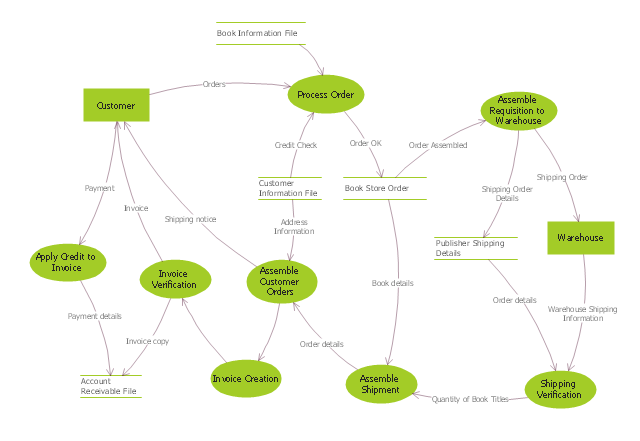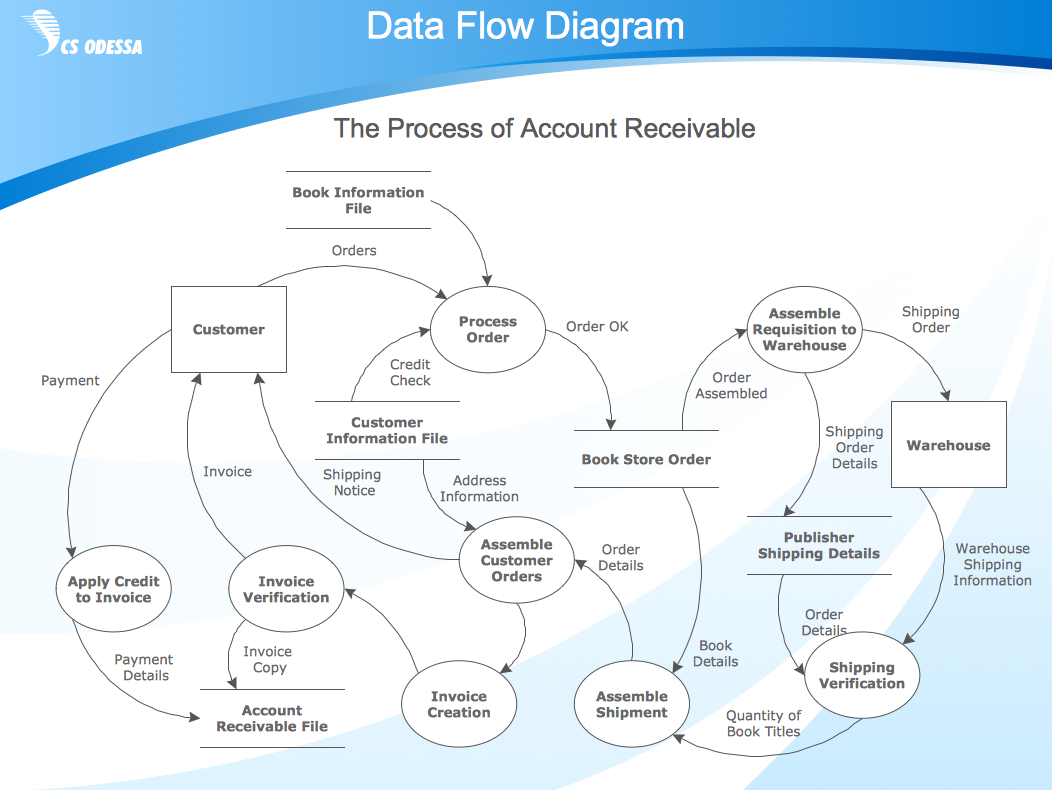"Data flow diagrams are one of the three essential perspectives of the structured-systems analysis and design method SSADM. The sponsor of a project and the end users will need to be briefed and consulted throughout all stages of a system's evolution. With a data flow diagram, users are able to visualize how the system will operate, what the system will accomplish, and how the system will be implemented. The old system's dataflow diagrams can be drawn up and compared with the new system's data flow diagrams to draw comparisons to implement a more efficient system. Data flow diagrams can be used to provide the end user with a physical idea of where the data they input ultimately has an effect upon the structure of the whole system from order to dispatch to report. How any system is developed can be determined through a data flow diagram model.
In the course of developing a set of levelled data flow diagrams the analyst/ designers is forced to address how the system may be decomposed into component sub-systems, and to identify the transaction data in the data model.
Data flow diagrams can be used in both Analysis and Design phase of the SDLC.
There are different notations to draw data flow diagrams (Yourdon & Coad and Gane & Sarson), defining different visual representations for processes, data stores, data flow, and external entities." [Data flow diagram. Wikipedia]
The DFD (Yourdon and Coad notation) example "Process of account receivable" was created using the ConceptDraw PRO diagramming and vector drawing software extended with the Data Flow Diagrams solution from the Software Development area of ConceptDraw Solution Park.
In the course of developing a set of levelled data flow diagrams the analyst/ designers is forced to address how the system may be decomposed into component sub-systems, and to identify the transaction data in the data model.
Data flow diagrams can be used in both Analysis and Design phase of the SDLC.
There are different notations to draw data flow diagrams (Yourdon & Coad and Gane & Sarson), defining different visual representations for processes, data stores, data flow, and external entities." [Data flow diagram. Wikipedia]
The DFD (Yourdon and Coad notation) example "Process of account receivable" was created using the ConceptDraw PRO diagramming and vector drawing software extended with the Data Flow Diagrams solution from the Software Development area of ConceptDraw Solution Park.
ConceptDraw DIAGRAM DFD Software
Our DFD software ConceptDraw DIAGRAM allows you to quickly create DFD with data storages, external entities, functional transforms, data flows, as well as control transforms and signals. DFD program ConceptDraw DIAGRAM has hundreds of templates, and a wide range of libraries with all nesassary ready-made drag-and-drop.- Data Flow Diagram Process | Why Flowchart Important to ...
- Data Flow Diagram Process | Account Flowchart Stockbridge ...
- DFD - Process of account receivable | Account Flowchart ...
- Accounts Receivable Cycle Flowchart
- Flow chart Example. Warehouse Flowchart | DFD - Process of ...
- How to Create Flowcharts for an Accounting Information System ...
- Accounting Process Flowchart Accounts Receivable
- Accounts Payable Process Flow Chart | Approval Process and ...
- DFD - Process of account receivable | Data Flow Diagram Process ...
- Account Flowchart Stockbridge System. Flowchart Examples | Flow ...
- Data Flow Diagram | Data Flow Diagram Process | DFD - Process of ...
- Accounts Payable Flowchart | Workflow to Make a Purchase ...
- Accounting Flowcharts | Accounting Data Flow from the Accounting ...
- Accounting Data Flow from the Accounting Flowcharts Solution ...
- Why flowchart is important to accounting information system? | How ...
- How to Create Flowcharts for an Accounting Information System ...
- Data Flow Diagram Process | DFD - Process of account receivable ...
- Accounts Receivable Flowchart Example
- Accounts Payable Flowchart | Accounts Payable Process Flow Chart ...

